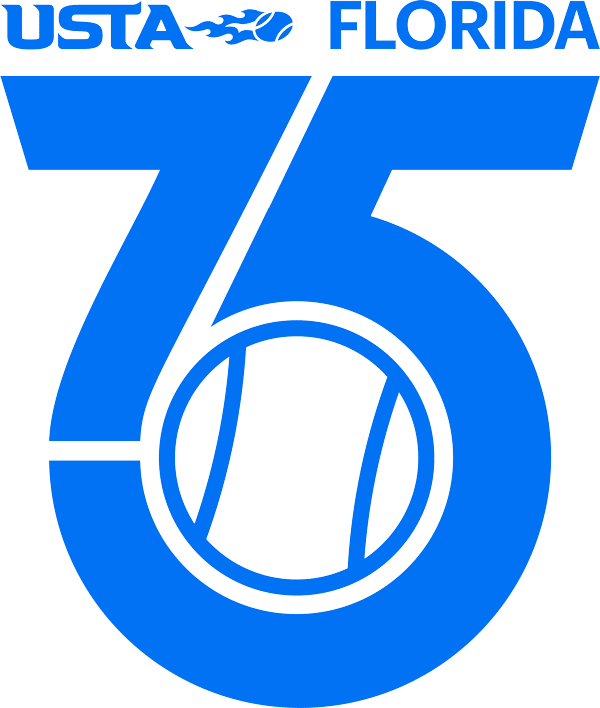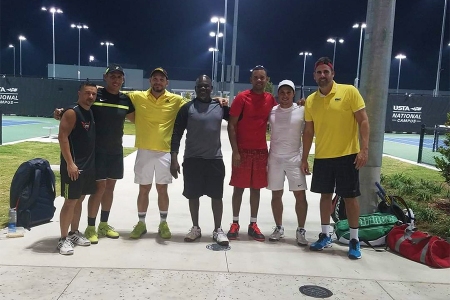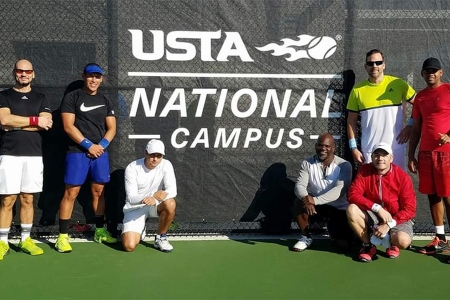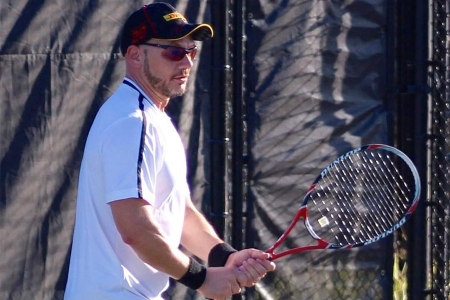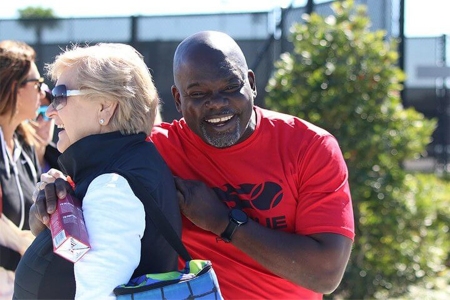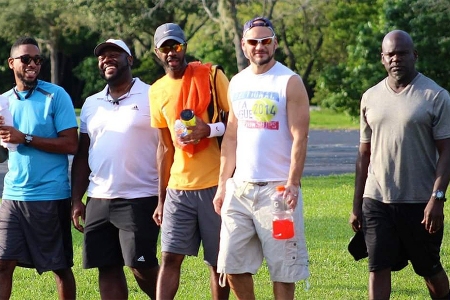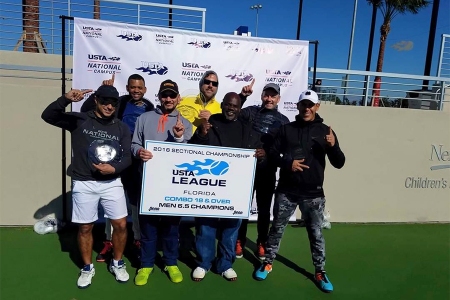June 25th, 2020
Pride Month Spotlight: Kevin Sims and Carlo Cantavero
USTA Florida’s mission is “to promote and develop tennis for all.” As a core value, we believe in providing opportunities for everyone to participate in the game of tennis, regardless of skill, age, physical ability, gender, ethnicity, economic background or sexual orientation. As June is Pride Month, we’re taking the opportunity to celebrate the diversity of the Florida tennis community.
Broward County league captain Kevin Sims and husband Carlo Cantavero have been married for six years after meeting on the court. Tennis is such a big part of both their lives that Sims even proposed to Cantavero in front of 200 people during a banquet following a tournament! Both are big advocates for inclusivity in tennis and are now sharing the impact tennis has had on their lives and the importance of their connection with the LGBTQ+ community.
Does tennis help you connect with the LGBTQ+ community?
Kevin: Tennis absolutely helps me connect with the LGBTQ+ community in many different ways, and it has for over the last 20 years I’ve been playing in the community. Tennis has been a really great outlet to meet people who love tennis and allows me to be engaged and learn a lot from others. I think finding people who enjoy and love the sport and those who are passionate for the sport locally, nationally and internationally has been an eye-opener for me.
Carlo: Tennis has been one of the many outlets that has allowed me to connect to the community. Both in the sport and the social aspects. Overall, it’s been a general good feeling: good social, good fitness, good everything. As someone who generally works a lot and doesn’t get out very much, this is one of the few outlets I have to really bring myself into the community and connect.
What is it like to be involved with an LGBTQ+ tennis organization?
Carlo: I’ve been fortunate to find a tennis league in our community. When I moved to Florida ten years ago, I needed something to connect me to people within my community because I didn’t really know anybody. Finding the league that I ultimately joined was beneficial to me because it gave me a sense of community, a sense of belonging, and a second family and a way to enjoy the outlet of tennis through people that had similar interests and philosophies. I don’t believe being involved in this tennis organization in our community is fundamentally different from other communities. We have a mixed assortment of tennis players and people who love to play at all levels. I think that’s what is nice – we have a diversity of ability, a diversity of people, and a diversity of community.
Kevin: For me, being involved with the LGBTQ+ tennis community is exceptionally gratifying. It allows me to be around people who, more or less, feel the same way I do. They accept my passion for tennis but also accept me for who I am. I don’t have to hide anything in this community. I can be myself and in doing that, I have made a lot of friends.
For those who may not know, what are some LGBTQ+ play opportunities for people in Florida?
Kevin: There are a whole bunch of opportunities. You have opportunities to play in different tournaments in Florida; for instance an Orlando tournament, a Miami tournament and tournaments with the South Florida Tennis Club in Fort Lauderdale. There are also plenty of opportunities outside of tournaments in local play, such as Friday and Saturday round robins and playing ladders. I think one of the building aspects that the LGBTQ+ community offers for each other is togetherness and acceptance through these social activities. You have the opportunity to meet others, get to know them and be social with one another.
Carlo: To echo Kevin, there is a plethora of opportunities. We have regional leagues. In Tampa there is Advantage, in Orlando there is the Orange Blossom Tennis Association, in Miami the Miami Mavericks and in Fort Lauderdale the South Florida Tennis Club. SFTC alone has well over 200 members. There are opportunities for interstate tournaments such as the Florida Cup and the Sunshine Cup, there are local social leagues, ladder leagues, team tennis leagues… everything you could possibly want. You just have to look but they are there!
Why should people participate in LGBTQ+ tennis activities and sports?
Carlo: Our community has a lot of athletes and a lot of sports. If you’re someone who likes tennis this is a good way for you to be able to play with people who relate to you socially, philosophically and athletically. It also gives you an opportunity to play against some people whose ability, I would arguably say, could give a lot of pros a run for their money!
Kevin: I believe participating in these types of activities encourages togetherness and fosters a lot of fellowship with one another. Who knows what other opportunities could develop from these social events and social activities.
What are some of your favorite LGBTQ+ community tennis events and what do you enjoy the most about them?
Kevin: My favorite LGBTQ+ community tennis events are the tournaments that we run locally, the Friday and Sunday round robins, the ladders we have, the social events, and the banquets that the clubs host to recognize players. Mainly, they are great social events that help promote fellowship within this community.
Carlo: I enjoy a lot of the local community events here, but one of my favorite to take part in are the GLTA tournaments. The reason for that is because they give me a chance to travel and associate with players that I don’t otherwise get to see everyday. They also give me the opportunity to compete with other people at my level or higher in other cities, and in some cases, other countries. It’s a way for us to bring ourselves together as a community through an outlet that we all love.
What has been your experience in the sport as a member of the LGBTQ+ community?
Kevin: My experience in the community has been phenomenal. I’ve had the opportunity to travel all over the country – Chicago, Detroit, New York – for LGBTQ+ tournaments. It’s been phenomenal to meet different people from different backgrounds and different professions, and it’s been nice to be able to connect and stay in touch with those individuals. If you’re in town not to even play tennis, you can meet up with those friends and vice-versa. Had it not been for tennis, I also would not have met my husband of six years now. I met the love of my life through this game. We started playing tennis together, were involved in the same clubs, and it’s been a great experience.
Carlo: When I was living in the Northeast, I was introduced to tennis in the gay community and the local gay leagues there. That’s where I discovered that I actually liked tennis and enjoyed playing with people who I could relate to. When I moved to Florida, I was able to again find a way to play with others like myself and that I could relate to. Being a member of this community has given me a second family. From this I’ve met a lot of people in different cities, different states, different countries and can associate with people who don’t care about my orientation, my philosophies of life or my world views – all they want to do is play tennis with people like them. I’ve made a lot of friends and close friends down here, and to top it all off, I married one! We’ve made a life for ourselves in and outside the sport.
Kevin: Even playing on my USTA teams and going to sectionals, Carlo has been part of that. It’s hard being the husband of a captain – you’re spending many nights out with your other teams, coming home late most nights and traveling weekend after weekend. Carlo has been a very supportive husband through all of it.
Carlo: The only thing I’ve asked in return out of all of this is if I need to buy another piece of furniture for the trophies he’s bringing home! I’ve also come to accept this is something he loves to do. He loves to bring people into this sport and into this community of players. He does this out of his own generosity. It’s not something he gets paid to do, it’s not something he has to do – he truly does this for the love of it. The people he brings in also do it for the love of the sport, the playing and the interactions. At the end of the day, that’s what being a community is all about. It’s about bringing all these people from separate places together through one interest and one passion. Kevin’s done a very good job of doing that in a number of ways and through a number of teams over the years. I think we’re better off for that.
How has the sport welcomed you?
Carlo: I’ve been welcomed with open arms. I remember the first day when I came to play a social league with the SFTC because I was new to Florida. They welcomed me as one of their own right out of the gate, introduced me to everyone and then we got right into hitting. I think it’s a pretty good way to do it.
Kevin: The sport has welcomed me by accepting my level of play at the time. I was first introduced to the Miami club and then ultimately the Fort Lauderdale club shortly after, and overall it’s been a friendly and family-like welcoming.
What does Pride mean to you?
Kevin: Pride means being happy with who you are no matter what. No matter who accepts you, no matter who doesn’t accept you – it’s just being happy for the type of person that you are. You should take pride in your character. For the LGBTQ+ community, Pride means just being happy with who you are.
Carlo: To me, Pride means to be comfortable with myself as I am, but I wasn’t for a long time. To accept what I am and not have to feel like I need to apologize for that – there’s nothing wrong with it. It means to also be aware of how far we’ve come as a community. I remember living in the Northeast as a young person when the first Stonewall riots happened. Between then and where we are now, it’s been a long time. I have met a lot of wonderful people in the community who have helped get us to where we’re at now, but I know that there is still a lot more work to be done. I feel like Pride means that I’m happy with the person I am. I’ve had to take a long road to get there, but I’ve reached it. It also means being comfortable with the person that I love, the person I married, the person I’m sharing a life with and the people like myself who are out there doing the same thing that we are.
Have you ever felt less valued in a tennis-related space because of your racial background?
Kevin: It’s a good question. I have felt less valued in the past because of my race in both the LGBTQ+ tennis community and the USTA community. I believe both communities have had their issues with race, acceptance and inclusion of everyone. I’ve found that sometimes, people don’t expect a Black man to be captaining a team locally. That was a difficult barrier to get around in order to gain respect from other local captains. When I’ve traveled to sectionals and nationals, I’ve found I’m one of the only Black American captains in captains’ meetings. It’s been a long road. Even in the LGBTQ+ community, everyone has their own cliques. As a gay African American male, it’s extremely difficult. Number one, you’re part of the gay community and you’re going into the USTA community which has a different mindset. Then on top of that, you’re Black. So that makes it a lot tougher and presents a lot more barriers when you’re participating in some of these activities.
People will gather in their own social circles but exclude Black American males. I see this all over – photos posted of their social gatherings and you hardly ever see a Black face there. I’m sorry, but you don’t. That’s been one of the trials that Black Americans have faced in any type of sport, whether it’s tennis or something else. For me, it’s trying to break down that barrier and not only be accepted as gay but being accepted as a gay Black man. So yes, it has been hard for the Black community. It’s been an eye-opening learning experience. Hopefully one day this will all change.
Have you experienced difficulty in finding support or a community in tennis?
Kevin: Finding support in my community hasn’t been difficult. You have a lot of people who want to play tennis and it’s all about the sport. USTA-wise, I’ve had the best USTA coordinator who supports me and all my efforts. Even locally in Fort Lauderdale and Miami, I recruit a lot of players from the LGBTQ+ community to play USTA and they have come on board and have been part of work in progress to be more inclusive. On the flip side, you have a lot of USTA players who will join our local LGBTQ+ activities as well. Both communities are now joining each other’s social activities, and it should be that way. Being united for one cause – and that cause is to play tennis.
USTA Florida believes tennis is for everyone. For more information on how you can support, participate in, or find tennis play opportunities for the LGBTQ+ community in Florida, visit USTAFlorida.com/Diversity.
